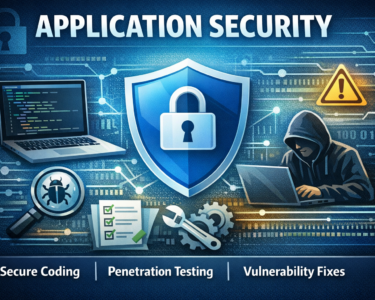Cybersecurity has become a cornerstone for business operations in a rapidly digitalizing world. Without proper security measures, companies can fall victim to numerous threats that can compromise sensitive information and cripple operations.
cyber threats become more sophisticated.
As cyber threats become more sophisticated, businesses of all sizes are increasingly targeted. From large multinational companies to small new businesses, everyone is at risk. Small businesses, in particular, may falsely assume they are safe from risk because of their small size.
However, cybercriminals often view smaller enterprises as easier targets due to potentially weaker security infrastructures. Regardless of size, each organization must stay vigilant to protect its data and maintain customer trust. Besides, the financial and reputational damage caused by a cyber- attack can be devastating, making strong cybersecurity measures more crucial than ever.
Common Cyber Threats.
Understanding the variety of cyber threats is critical for defense. Enterprises encounter risks like phishing scams, ransomware, and data breaches, each with unique features and entry tactics. Resources like CSO Online provide valuable insights into these threats and their latest modifications. Implementing comprehensive cybersecurity solutions is essential to protect against these potential risks.
Phishing attacks are among the most common cyber threats, targeting employees’ emails to trick them into revealing sensitive information. These attacks often appear as legitimate communications, making them difficult to detect. Ransomware is another significant threat, locking down essential systems until a ransom is paid. The devastating effects of ransomware can halt business operations and lead to substantial financial losses. Data breaches, where large volumes of sensitive information are exposed, can occur through various methods, including hacking and insider threats. Being aware of these threats is the first step in mitigating them effectively.
Key Cybersecurity Principles.
Confidentiality: Ensuring that private data is accessible only to authorized individuals. This principle focuses on protecting sensitive information from unauthorized access, crucial for maintaining customer trust and compliance with regulations.
Integrity: Maintaining the accuracy and reliability of data. Data integrity protects information from being altered or tampered with, ensuring it remains accurate and trustworthy over its lifecycle.
Availability: Ensuring that authorized users have timely and reliable access to resources. Availability guarantees that the needed information and systems are accessible when required, preventing disruptions in business operations.
These principles form the backbone of any solid cybersecurity strategy. Businesses can create a layered security approach that significantly reduces risks by focusing on these core areas. Prioritizing confidentiality, integrity, and availability helps develop a comprehensive security framework that addresses information protection from all angles. This layered approach extends beyond technology, incorporating processes and policies that fortify the overall security posture.
Technology and Tools for Better Security.
Advanced technologies such as AI-driven security systems and encryption tools can significantly enhance a company’s cybersecurity infrastructure. AI can help detect unusual patterns and potential threats before they cause harm, providing a vital layer of proactive defense. Strong encryption guarantees that intercepted data stays incomprehensible without the correct keys. This is especially crucial for safeguarding confidential customer data and adhering to data protection laws.
Employing technologies like multi-factor authentication (MFA), intrusion detection systems (IDS), and advanced firewalls also strengthens security measures. For more details on these technologies, refer to this TechRadar article. These tools protect against external threats and help monitor and control internal access and usage, ensuring that all entry points are secured. Investing in the best tools available on the market is essential to a proactive cybersecurity posture, helping businesses stay ahead of ever-evolving threats.
The Importance of Employee Training.
Employees are the first line of defense against cyber threats. Regular training programs and simulations can help them recognize and respond to potential threats effectively. Employees must understand the various types of cyber threats and the protocols in place to address them. This includes recognizing phishing attempts, understanding the importance of password security, and knowing how to report suspicious activities.
Ensuring employees understand the latest cybersecurity threats and the company’s protocols can drastically reduce the risk of successful attacks. Training should include basic practices such as strong password creation, recognizing phishing emails, and safe internet usage. Additionally, key personnel should receive advanced incident response and data protection training. Continual education and awareness-building can foster a culture of security within the organization, empowering employees to act as vigilant protectors of company data.
Staying Updated with Cybersecurity Trends.
The cybersecurity landscape constantly evolves, with new threats and technologies emerging regularly. To maintain a strong defense, businesses must stay informed about the latest trends and updates. Subscribing to industry newsletters and participating in cybersecurity forums are good practices to stay updated. Regularly checking reputable sources of cybersecurity news can provide crucial information on emerging threats and new protection technologies.
Ensuring a robust cybersecurity strategy means continuous education and adaptation. By staying updated, businesses can stay one step ahead of cybercriminals, maintaining the integrity and security of their networks. Engaging in cybersecurity webinars, attending conferences, and collaborating with industry experts can provide valuable insights and network-building opportunities. Proactive engagement with the cybersecurity community helps share knowledge and best practices, ultimately contributing to a more robust, resilient defense against cyber threats.







